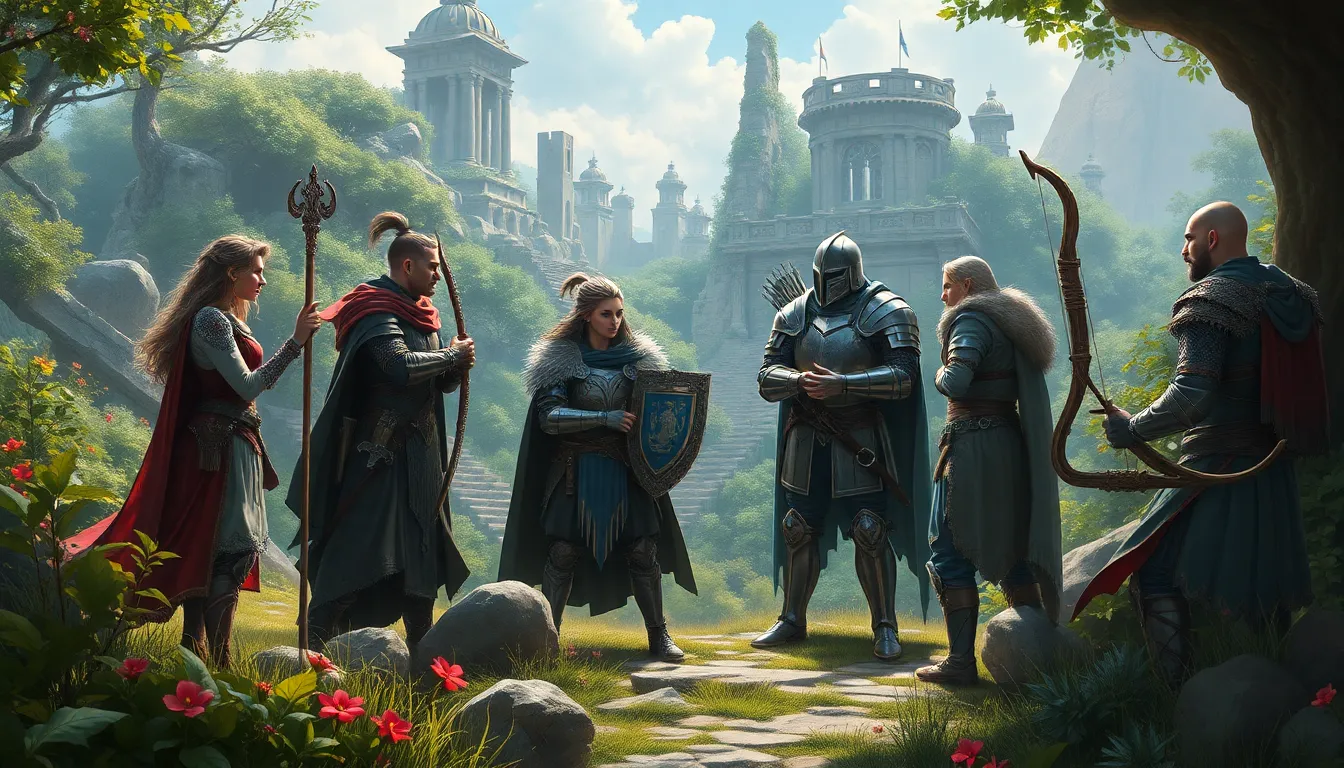Table of Contents
ToggleTurn-based RPGs have captivated gamers for decades, offering a unique blend of strategy and storytelling. In these immersive worlds, players take turns making tactical decisions, allowing for thoughtful planning and deep engagement with the game’s mechanics. This genre has evolved significantly, from classic titles to modern interpretations that push the boundaries of gameplay and narrative.
As players navigate richly crafted environments and develop their characters, they experience a sense of progression that keeps them coming back for more. Whether battling fierce monsters or unraveling intricate plots, turn-based RPGs provide an experience that challenges players’ minds while drawing them into unforgettable adventures. With a diverse array of games available, there’s something for everyone in this beloved genre.
Overview of Turn-Based RPG
Turn-based RPGs (role-playing games) require players to take turns when executing actions during combat, unlike real-time combat systems. This structure allows for strategic planning and consideration of each move. Players control characters that level up through experience points, enhancing their abilities, skills, and attributes.
Key features often include:
- Character Development: Players customize characters through unique classes, skills, and equipment. Choices impact gameplay and narrative.
- Storytelling Elements: Rich narratives fuel immersion. Players often face moral choices that influence character arcs and the game world.
- Combat Mechanics: Turn-based combat often includes various strategies like using status effects, area control, and elemental advantages. Players must evaluate enemy weaknesses to devise efficient battle plans.
- Exploration: Players wander expansive worlds filled with quests, treasures, and lore. Exploration enhances character growth and story engagement.
- Progression Systems: Leveling up unlocks new skills and abilities. Many games feature branching skill trees that allow for personalized character builds.
The turn-based RPG genre thrives on a blend of traditional mechanics and innovative ideas, appealing to a wide audience. As it evolves, modern titles incorporate hybrid systems and enhancements, attracting both nostalgic players and newcomers.
Key Features of Turn-Based RPG

Turn-based RPGs offer distinctive features that enhance player engagement. These elements foster deep strategy and immersive storytelling.
Combat Mechanics
Combat mechanics define the tactical framework of turn-based RPGs. Players select actions for each character during their turn, promoting strategic planning. Key components include:
- Action Points: Each character typically receives a certain number of action points per turn, allowing players to choose between attacking, defending, or using skills.
- Status Effects: Characters can inflict and suffer from various status effects, such as paralysis or poison, which influence combat outcomes.
- Combo Attacks: Many games allow characters to execute combo attacks, enhancing damage when specific conditions are met, requiring coordination among team members.
- Turn Order: The order of turns is influenced by character speed stats, adding an element of anticipation and strategy.
Character Development
- Skill Trees: Players can navigate complex skill trees, unlocking abilities that suit their playstyle, resulting in varied character builds.
- Leveling Up: Gaining experience points during battles leads to level-ups, providing increased stats and new skills.
- Equipment Customization: Players can equip characters with diverse weapons and armor, affecting gameplay style and combat effectiveness.
- Moral Choices: Decisions made during quests and interactions influence character development and overarching narratives, enriching player investment in the storyline.
Popular Turn-Based RPG Titles
Turn-based RPGs continue to captivate both new and seasoned players. Several standout titles illustrate the genre’s evolution and depth.
Classic Games
- Final Fantasy VI: Lauded for its rich story and character development, this 1994 title introduced players to the world of balance between magic and technology. Its varied gameplay mechanics, including the Active Time Battle system, set a standard for future games.
- Chrono Trigger: Released in 1995, this RPG features time travel as a core mechanic, leading players through multiple timelines. Its combination of engaging narrative and groundbreaking graphics has established it as a timeless classic.
- EarthBound: This quirky 1994 RPG captured hearts with its modern-day setting, humor, and unique battle mechanics. Players enjoy its charm and heartfelt story while navigating turn-based combat.
Modern Releases
- Persona 5: Introduced in 2016, this title blends life simulation with traditional turn-based combat. Players juggle relationships and dungeon exploration in a stylish, anime-inspired world that captivates audiences.
- Divinity: Original Sin 2: Released in 2017, this game expands the possibilities within turn-based RPGs with its deep narrative and strategic combat. Players can manipulate the environment and interact with a rich world in diverse ways.
- Octopath Traveler: Launched in 2018, this unique RPG features eight characters with distinct stories and gameplay styles. Its blend of retro-inspired graphics and modern mechanics appeals to both new and old fans.
- Triangle Strategy: Released in 2022, this tactical RPG highlights strategic decision-making in both combat and narrative. Players navigate moral choices that shape the world, adding depth to gameplay.
These titles exemplify the rich history and ongoing innovation within the turn-based RPG genre.
The Appeal of Turn-Based RPG
Turn-based RPGs captivate players through their unique blend of strategy and storytelling. This genre’s enduring popularity stems from its intricate mechanics and engaging narratives.
Strategic Gameplay
Strategic gameplay defines turn-based RPGs, allowing players to think critically and devise tactical plans during battles. Players navigate combat using action points, which dictate the number of moves and abilities available per turn. This encourages thoughtful decision-making, as players weigh attacks, defenses, and item usage.
Turn order plays a vital role, influenced by character speed, fostering anticipation and strategizing among players. Status effects, such as poison or paralysis, can shift battle outcomes. Combo attacks create additional layers of strategy, rewarding players for cooperative moves between characters. Together, these elements form a combat system that engages players in meaningful tactical planning.
Narrative Experience
Narrative experience greatly enhances the appeal of turn-based RPGs. Rich stories draw players into immersive worlds filled with compelling characters and moral dilemmas. Players often encounter choices that affect plot outcomes and character development, allowing deeper investment in their journeys.
Character backstories contribute to emotional engagement, as players explore personal motivations and relationships. As players progress, the unfolding narrative evokes a sense of achievement tied to their actions. The combination of strategic gameplay with impactful storytelling makes for a fulfilling RPG experience, reinforcing the genre’s beloved status among gamers.
Future Trends in Turn-Based RPG
Turn-based RPGs are on the brink of exciting advancements. Innovations in gameplay and evolving storytelling techniques shape the future of this beloved genre.
Innovations in Gameplay
Innovations influence turn-based RPGs by integrating hybrid gameplay experiences. Designers blend traditional mechanics with real-time elements, enhancing engagement. For instance, games now utilize action point systems, allowing players to make strategic decisions regarding movement and ability usage. Features like combo attacks introduce synergy among characters, making battles dynamic and rewarding. Developers also experiment with environmental interactions, permitting players to leverage their surroundings to gain tactical advantages.
Incorporating multiplayer elements creates new dimensions in gameplay, enabling cooperative strategies and competition. Games featuring online co-op modes or competitive arenas empower players to engage with friends or foes, enhancing the social experience. Additionally, the implementation of AI-driven companions enriches combat strategies, as players coordinate with NPCs that learn from their decisions.
Evolving Storytelling Techniques
Storytelling techniques evolve to create deeper connections with players. Developers emphasize player agency through branching narratives and moral choices that impact not just immediate gameplay but long-term consequences. This depth fosters a sense of investment in character progression and world-building.
Visual storytelling advancements enhance narrative delivery. Cinematic cutscenes and dynamic dialogue systems immerse players in rich narratives, offering emotional gravitas and impactful decisions. Furthermore, genres like fantasy and sci-fi blend seamlessly, allowing for diverse storylines that appeal to various audiences.
Integrating lore within gameplay offers a holistic experience. From environmental storytelling to collectible lore items, players interact with a world filled with history, making them feel part of the story. This approach cultivates a richer gaming environment, allowing for exploration and discovery at every turn.
Turn-based RPGs continue to captivate players with their unique blend of strategy and storytelling. The genre’s evolution showcases its adaptability while maintaining core elements that fans love. As developers embrace innovative mechanics and narrative techniques, the future of turn-based RPGs looks promising.
Players can expect even more engaging experiences as hybrid gameplay and AI-driven companions become more prevalent. The emphasis on player agency and immersive storytelling will only deepen connections with characters and worlds. With a rich history and a bright future, turn-based RPGs will remain a beloved choice for gamers seeking both challenge and narrative depth.







